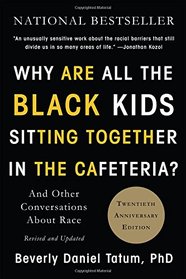Marcia C. reviewed Why Are All the Black Kids Sitting Together in the Cafeteria?: And Other Conversations About Race on + 700 more book reviews
I thought the long introduction to the 2017 edition of this book was terrific: a detailed chronology of social/political developments in the USA since the first edition in 2000. It includes the development of Black Lives Matter, Trump and Obama. I was nodding along with the author almost all the way through this section of the book.
My attitude changed when I got into the book proper. She defines racism in such a way that people are racist if they benefit from White supremacy, regardless of their personal beliefs, attitudes and behaviors. This seems like an extreme and quite unfair version of blaming people for what their ancestors did. "Racist" is such a loaded term in our culture, it's no wonder that Whites would not want to be saddled with that broad-brush label.
I also did not understand her views about "Black students sitting together in the cafeteria," as in the title of the book. She seems to be saying that anyone who doesn't have a primary bond with people of their own race cannot be healthy psychologically. She seems to be against people of different races mixing together respectfully at work and/or in friendship. It will have negative consequences for the mental health of Blacks, she implies. To me what this does is to create a never-ending cycle of race consciousness and suspicion between races.
For me, racism is evil and White privilege is an unfortunate reality. But I believe it would be equally evil for Whites to develop "White consciousness," which the author appears to advocate. Instead, I believe the goal should be to put an end to all forms of prejudice and discrimination.
In short, I most emphatically do not recommend this book as representing a step forward in positive relations between people of different backgrounds. Sorry about that!
My attitude changed when I got into the book proper. She defines racism in such a way that people are racist if they benefit from White supremacy, regardless of their personal beliefs, attitudes and behaviors. This seems like an extreme and quite unfair version of blaming people for what their ancestors did. "Racist" is such a loaded term in our culture, it's no wonder that Whites would not want to be saddled with that broad-brush label.
I also did not understand her views about "Black students sitting together in the cafeteria," as in the title of the book. She seems to be saying that anyone who doesn't have a primary bond with people of their own race cannot be healthy psychologically. She seems to be against people of different races mixing together respectfully at work and/or in friendship. It will have negative consequences for the mental health of Blacks, she implies. To me what this does is to create a never-ending cycle of race consciousness and suspicion between races.
For me, racism is evil and White privilege is an unfortunate reality. But I believe it would be equally evil for Whites to develop "White consciousness," which the author appears to advocate. Instead, I believe the goal should be to put an end to all forms of prejudice and discrimination.
In short, I most emphatically do not recommend this book as representing a step forward in positive relations between people of different backgrounds. Sorry about that!




